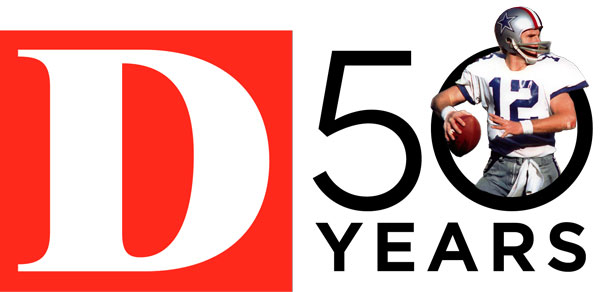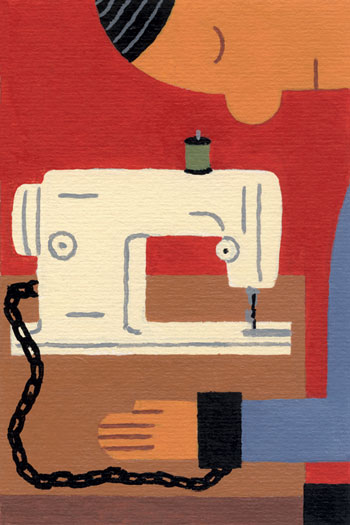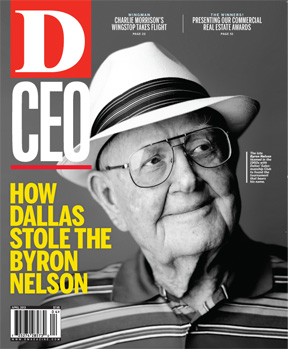In the pro shop at the glitzy Cowboys Stadium in Arlington, rows of jerseys, shirts, and jackets sport the silver star of America’s Team.
But the merchandise is hardly all-American. There’s a $250 Tony Romo jersey made in Honduras. A $135 Dez Bryant jersey from Guatemala. Hats from China and Bangladesh, golf shirts from Thailand and Indonesia, even a football stamped “Vietnam.”
This is 21st century globalization at work: manufacturers trolling the globe to find the cheapest place to make a product, so it can be sold at the best price to consumers—and the highest profit margin. Recently, however, growing reports of sweatshop conditions in foreign garment factories—low wages, long hours and deadly fires—have put some North Texas business icons on the defensive.
In Cambodia, young women said they worked 60 hours a week, making 29 cents an hour, to sew Cowboys apparel, including jackets that sell for as much as $100 apiece, according to a January 2012 report by ESPN’s Outside the Lines. In America, United Students Against Sweatshops mounted a campaign last year against Silver Star Merchandising, a Cowboys unit bidding for a major deal to supply apparel to Ohio State University. The university chose another vendor.
In Bangladesh, a November blaze that killed 112 workers has put a spotlight on factories that make goods for J.C. Penney, Wal-Mart and other U.S. retailers. The Christian Science Monitor reported that doors to the Tazreen Fashions factory were padlocked and the eight-story building lacked outside fire escapes, leading some workers to jump to their deaths. Labor rights activists later found jeans bearing the labels of Wal-Mart’s Faded Glory brand and Fort Worth-based Dickies inside the burned-out plant.
Both companies said they had cut ties with the Bangladesh factory before the fire and didn’t know their products were being made there. Cowboys spokesman Brett Daniels says the football team had used the Cambodian plant for just a small order before the ESPN report ran, and hasn’t used it since.
Still, there is public fallout. Dangers in foreign garment factories have been gaining attention, as clothing manufacturers criss-cross the globe in pursuit of cheap labor. Since 1990, more than 1,000 garment workers have been killed and 3,000 others injured in fires and other factory accidents in Bangladesh, according to “Deadly Secrets,” a report issued in December by the International Labor Rights Forum.
Virtually every big U.S. retailer—and every sports team—has clothing made overseas and finds themselves in the tricky position of monitoring faraway plants. Nike, a target of complaints for two decades, has increased inspections and now lists the names and locations of every foreign supplier plant on its website.
Following the Tazreen fire, Wal-Mart said it would tighten its safety standards in foreign plants, and pledged to cut off any supplier that subcontracts work to an unauthorized factory.
Last year, the Cowboys joined the Fair Labor Association, a group of businesses, universities, and organizations that have pledged to uphold labor standards. The Cowboys and its affiliate, 289c Apparel, also invested in a project with Better Factories Cambodia to provide cellphones to garment workers so they can report problems to the watchdog group, according to a website which details its Code of Conduct.
“We all know and acknowledge that not every factory is perfect,” Daniels says. “But rather than walk away, we want to work with them to make them better for everyone.”
Plano-based J.C. Penney was among the U.S. companies targeted by activists after a December 2010 fire killed 30 at a Bangladesh factory it had used to make clothing. The retailer, which says it was not using the plant at the time of the fire, became “part of a united effort to distribute a fire safety film and other supporting materials to approximately 650 factories in Bangladesh,” a spokesman says.
But corporate policies and video training aren’t nearly enough, labor advocates say. Factories need physical improvements, such as fi re escapes, and that requires money.
“What we really need is a departure from the past in terms of what brands are doing,” says Liana Foxvog, organizing director for the ILRF, a Washington-based group that advocates for humane working conditions around the world. Supplier factories need to be paid enough for their goods so they can afford to make necessary improvements, she says. But low costs, of course, are the reason U.S. companies have shifted production to some of the poorest nations.
Bangladesh is a prime example. During the past decade, manufacturers have flooded into the country, making it a center for the garment industry and its dangers. Workers there are the lowest-paid in the world, earning a minimum wage of $37 a month.
On this side of the supply chain, the money piles up. Wal-Mart is the nation’s biggest retailer, racking up profits of $15.7 billion in 2011. The Cowboys are the most valuable NFL franchise, according to Forbes magazine, worth an estimated $2.1 billion. Forbes estimates that the Cowboys brought in $80 million in the past year from merchandise sales.
Remember the workers making 29 cents an hour the next time you pull on your Cowboys gear.







